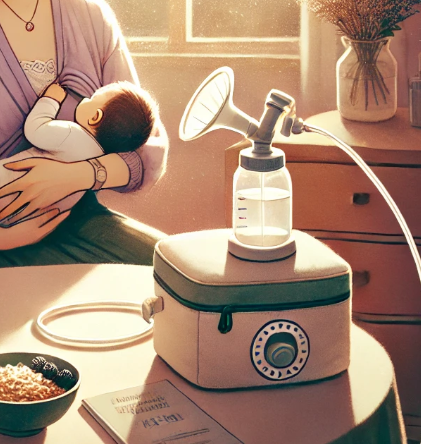
Breastfeeding is a journey—but what happens when you suspect your milk supply is drying up? As a doctor (and someone who was breastfed for two full years by my mom), I understand the anxiety. Maybe your baby seems fussier, your breasts feel softer, or pumping yields less milk. Before panic sets in, let’s separate fact from fear. Here’s how to tell if your supply is truly low, what might be causing it, and—most importantly—how to fix it.
Key Signs Your Milk Supply Is Drying up
Baby’s behavior cues:
– Fussiness at the breast
– Shorter or less frequent feeds
– Increased hunger after nursing
Physical changes in mom:
– Softer breasts (less fullness)
– Reduced letdown sensation
– Less leakage between feeds
Pumping output drops:
– Noticeably less milk expressed
– Slower refill time between sessions
Common Causes of Low Milk Supply
Poor latch or ineffective feeding
Baby isn’t draining breasts fully → signals body to make less milk.
Example: Painful nipple cracks (like my sister’s severe case) can disrupt latch, creating a cycle of low supply.
Infrequent nursing/pumping
Supply works on demand – skipping sessions (even for 1-2 days) can drop supply quickly.
Dehydration or poor nutrition
Breast milk is 88% water – even mild dehydration affects output.
<500 extra calories/day needed (quality matters more than quantity!).
Hormonal factors
– Birth control (especially estrogen-containing pills).
– Thyroid disorders (hypothyroidism = common culprit).
– Stress (cortisol blocks prolactin – the “milk-making hormone”).
Medical conditions
– PCOS (hormonal imbalances reduce glandular tissue).
– Anemia (low iron = low milk volume).
– Retained placenta (progesterone stays high, suppressing milk).
Pain-induced interruptions
Example: Severe nipple cracks and milk supply are related; some women experience even bleeding nipples, which may require a temporary pause. My sister had to pause for 1 day, and she started complaining about low milk supply already.
Key: Pumping during the break (even if minimal) helps maintain supply better than stopping completely.
How to Confirm Low Supply (and Rule Out False Alarms)
– Weight checks: Is the baby gaining adequately? (The gold standard!)
– Diaper count: At least 5-6 wet diapers/day after day 5
Days 1-2: 1-2 wet diapers/day (early milk is thick colostrum).
Days 3-4: 3-4 wet diapers/day (transitional milk comes in).
Day 5+: 5-6+ wet diapers/day (sign of established milk supply).
– Paced bottle feeding test (if supplementing)
How It Works:
– Step 1: Offer a small amount (1–2 oz) of pumped milk/formula in a bottle using paced feeding:
Hold baby upright.
Use a slow-flow nipple.
Tilt bottle horizontally (so milk doesn’t pour out).
Pause every 10–15 seconds to mimic breastfeeding.
– Step 2: Observe baby’s reaction:
If baby refuses or drinks minimally → Likely getting enough from the breast.
If baby gulps urgently → May indicate hunger from low supply.
– Why It Matters for Milk Supply:
Rules out “false low supply” (some babies fuss at the breast but aren’t truly hungry).
Prevents overfeeding (bottles flow faster, so babies may take more than they need).

– When to See a Lactation Consultant
Baby’s Health:
Poor weight gain (<20g/day after Day 10).
Fewer than 5–6 wet diapers/day (after Day 5).
Constant hunger/fussiness after feeds.
Mom’s Experience:
Severe pain (beyond mild initial soreness).
Bleeding/cracked nipples (like your sister’s case).
Suspected low supply despite frequent feeding.
Returning to work/school and needing pumping support.
What a Lactation Consultant Does:
Checks latch/positioning (90% of “supply issues” stem from poor latch!).
Assesses baby’s oral anatomy (tongue/lip ties).
Creates a personalized plan to boost supply (if needed).
Helps transition back to breastfeeding after breaks (e.g., nipple crack recovery).
Pro Tip:
Many insurance plans cover lactation visits—no need to struggle alone!
Hospitals often have consultants on staff; ask for a referral.
Hydration & Lactation-Boosting Foods
If you had to pause your breastfeeding, it’s important to know that it’s normal to see a slight drop in your milk supply. The first thing you need to do is be cautious about what you eat:
– Drink 1 glass of water every time you nurse/pump (dehydration = #1 supply killer!).
– Eat galactagogues (milk boosters):
Oatmeal (best for supply – try 1 bowl/day).
Brewer’s yeast (add to smoothies).
Fenugreek (caution: can lower supply in some women – monitor closely).
Dates & almonds (traditional Middle Eastern remedies).
– Bonus: Warm fennel tea or “lactation cookies” (with oats + flaxseed) can help.
Best Vitamins & Supplements to Boost Milk Supply
1. Fenugreek (Fenugrec / Trigonelle)
How it works: Contains phytoestrogens that may stimulate milk production.
French brands:
Arkogélules Fenugrec (pharmacy)
Nutrimea Lactation (fenugreek + milk thistle blend)
Dose: 1,500–3,000 mg/day (capsules or tea).
Caution:
Avoid if diabetic (lowers blood sugar).
20% of women see no effect or a drop in supply – monitor closely.
2. Blessed Thistle (Chardon Béni)
– Often paired with fenugreek for synergistic effects.
– French option: Lactaline (fenugreek + blessed thistle combo, sold in pharmacies/online)
3. Milk Thistle (Chardon-Marie)
– Supports liver function (key for hormone balance).
Find it in:
– Natalait (French lactation tea with milk thistle, anise, fennel).
– Dietaroma Lactation Capsules (organic, pharmacy-grade)
4. Spirulina (Spiruline)
Rich in iron & protein – critical for milk synthesis.
French brands:
– Fleurs de Spiruline (organic, powdered form for smoothies).
– Nutri&Co Spirulina (capsules).
7. Probiotics (For Gut-Health-Milk Supply Link)
– Emerging research shows gut health impacts lactation.
Try: Lactibiane Allaitement (specifically formulated for breastfeeding moms)
Natural French Remedies (Grandmother’s Wisdom!)
Galactagogue teas:
Natalait Infusion (caraway + verbena) – Monoprix/Amazon. Natalait Infusion Allaitement (Pack of 3 x 20 Sachets)
Jardin Bio Tisane Allaitement (organic, anise-fennel taste)
Alfalfa (Luzerne) tablets
Sold in organic stores (Biocoop)
What to Avoid:
Sage & peppermint (anti-galactagogues – reduce supply).
Excess caffeine/alcohol (dehydrating).
You can read the full guide for foods to avoid while breastfeeding
For more infos about practical tips to boost your milk supply






